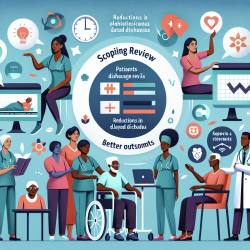Enhancing Practitioner Skills with WIDER Recommendations
In the ever-evolving field of speech-language pathology, staying abreast of the latest research and methodologies is crucial for delivering effective interventions. One such advancement is the development of a checklist based on the Workgroup for Intervention Development and Evaluation Research (WIDER) recommendations. This checklist, as detailed in the research article "Development of a checklist to assess the quality of reporting of knowledge translation interventions using the WIDER recommendations," offers a structured approach to improving the quality of reporting in knowledge translation (KT) interventions.
Understanding the WIDER Recommendations
The WIDER recommendations provide a framework to enhance the clarity and detail of behavior change interventions (BCIs). These recommendations emphasize the importance of detailed reporting to facilitate replication, further development, and scaling up of interventions. The checklist developed by Albrecht et al. operationalizes these recommendations, enabling practitioners to systematically assess and compare the quality of intervention reporting across various studies.
Implementing the Checklist in Practice
For practitioners, the checklist serves as a valuable tool to ensure comprehensive reporting of intervention components. By utilizing this checklist, practitioners can:
- Identify gaps in current intervention reports and address them to improve clarity and replicability.
- Enhance the quality of intervention documentation, making it easier for peers to understand and replicate successful strategies.
- Facilitate the sharing of best practices within the field, contributing to a collective improvement in intervention outcomes.
The iterative development of the checklist, as described in the research, highlights its adaptability and potential for refinement. Practitioners are encouraged to engage with the checklist actively, providing feedback and insights that can drive further enhancements.
Encouraging Further Research and Development
While the checklist is a significant step forward, it also opens avenues for further research. Practitioners are encouraged to explore the checklist's application in diverse settings and with various intervention types. Such exploration can lead to the identification of additional factors that influence intervention success, ultimately enriching the WIDER framework.
Moreover, the checklist's development underscores the importance of collaboration between researchers and practitioners. By working together, these groups can ensure that interventions are not only theoretically sound but also practically effective and applicable in real-world settings.
Conclusion
For speech-language pathologists and other practitioners in the field, the WIDER Recommendations Checklist represents a powerful tool for enhancing the quality and effectiveness of intervention reporting. By adopting this checklist, practitioners can contribute to a more robust and reliable body of knowledge, ultimately leading to better outcomes for children and other clients.
To delve deeper into the research and explore the full potential of the WIDER Recommendations Checklist, I encourage you to read the original research paper: Development of a checklist to assess the quality of reporting of knowledge translation interventions using the Workgroup for Intervention Development and Evaluation Research (WIDER) recommendations.










